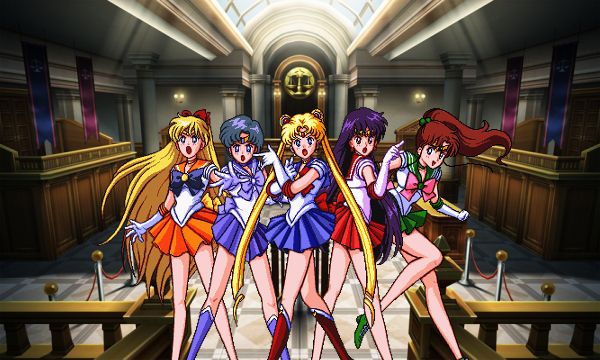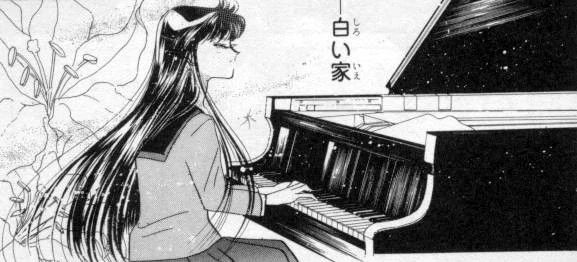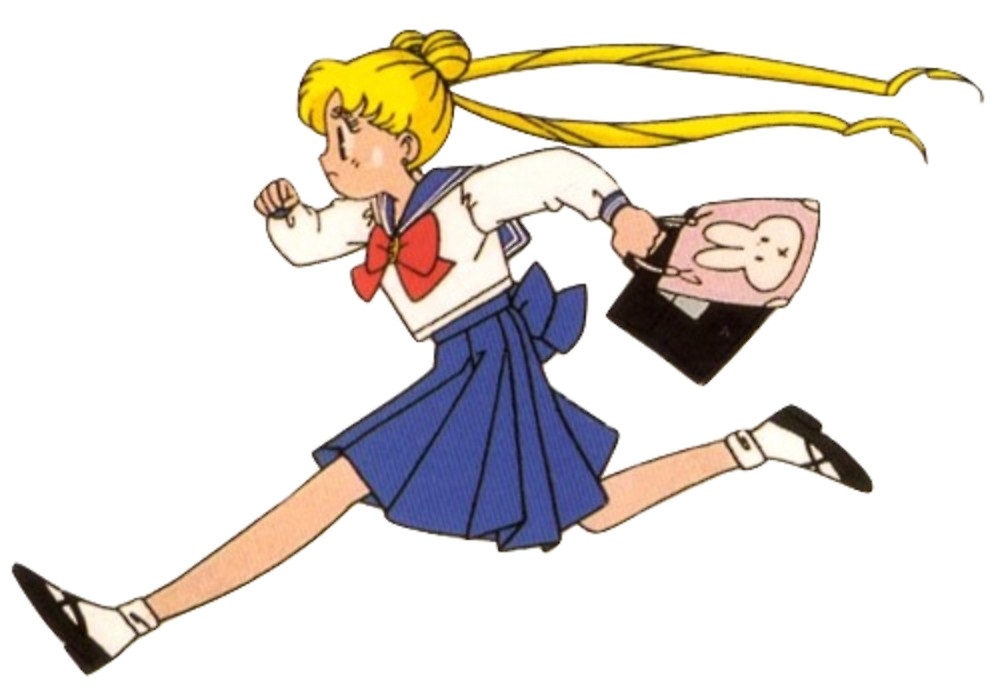What’s that? Didn’t I already talk about the possible plagiarism by everyone’s favorite Sailor Moon theme song, Moonlight Densetsu?
Of course I did! But thanks to the wonderful readers here, commenters on Twitter, and further research, it’s come to my attention that there was not only an even earlier song that sounds suspiciously similar to DALI’s hit, but they were actually even accused of copyright infringement.
Well, let’s get started!
While it’s easy for me to ramble on an discuss the similarities between the two songs at length, I think it’d make more sense to listen to the song first, before we go any further.
What you just listened to was Sayonara wa Dansu no Ato ni (さようならはダンスの後に; Save Your Goodbyes for After the Dance),1 a 1965 hit sung by Chieko Baisho.2
If you don’t recognize her name, I don’t blame you since she’s not too popular outside of Japan and isn’t very active nowadays. However, you may recognize her as the voice actress for Sophie in Studio Ghibli’s “Howl’s Moving Castle.” Probably not, but now you know!
Like most musical sensations, however, Chieko Baisho did not actually write her own music, and this song was no different. It was written by one Hirooki Ogawa,3 a prolific composer who composed and arranged songs for top musicians in addition to themes and background music for Japanese tv from the late 1950s through the early 1990s. He also wrote the theme to Gekkou Kamen, so hey! There’s a connection!
He was also an auditor for the Japanese Society for Rights of Authors, Composers and Publishers (JASRAC)4 – the body that oversees copyrighting of creative works in Japan. That’s not a good thing when accusations start flying around about his copyright being violated.
According to a 2012 JASRAC report,5 Hirooki approached Masao Handa,6 a professor of the faculty of law at Aoyama Gakuin University who practices in Copyright and Media law, to ask his opinion on the song.
「土曜日の夜7時に『美少女戦士セーラームーン』というのをテレビでやっておりますから、それを聞きましたら、先生(筆者注:小川寛興先生のこと)の曲の盗作であると思ってまず間違いありません」
And in English…
“This show, “Pretty Soldier Sailor Moon,” is on TV at 7pm on Saturdays, so I gave it a listen. When I heard the song, there wasn’t a doubt in my mind that it was a plagiarism of his (Hirooki Ogawa’s) song.”
Though he probably had a pretty strong case for copyright infringement, the parties chose to arbitrate the matter rather than go to court. Why’s is that?
Once again, according to the same report, the Japanese music industry is pretty small, and everyone knows and works with each other. Once you start going around and making accusations – even if you’re right – it’s going to hurt your career too in addition to the image of the industry as a whole. Considering how common backroom deals are in Japan, I don’t think anyone wants this laundry aired.
While the terms of the arbitration are obviously not public, it’s worth noting that an agreement was reached between Hirooki and Daria Kawashima7 (who is credited as Tetsuya Komoro for Moonlight Densetsu), wherein a percentage of Moonlight Densetsu’s royalties would go to him. I can’t get a fix on the number, but it sounds like it’s ongoing, so I’m sure it’s continuing even to today!
So, does that finally bring us to the end of the drama surrounding Sailor Moon‘s much-loved theme song? Surprisingly, no.
Though there’s not as much of an open-and-shut case as there was with both “Sayonara…” and “Yume…,” there are many who say that there are two other songs that may have played a role in inspiring what would eventually become Moonlight Densetsu.
One of these songs is the 1991 single, and theme song to the TBS television show Nurse Station, by the idol group Mi-Ke8 titled Omoide no Kujuuku Ri Hama (思い出の九十九里浜; The Endless Beach of My Memories).9
Making things even more complicated, that song was itself a partial parody of the 1967 Koi no Fuuga (恋のフーガ; Love Fugue),10 by the twins Yumi and Emi Ito, known better as The Peanuts.11
So there you have it – a far more extensive background than you ever thought you wanted to know about the suspected musical “inspirations” behind the magical girl theme song that defined a generation.
With the huge libraries of character songs, opening and ending themes, and background music appearing throughout the series, it makes you wonder what other musical secrets may be hiding. Like, for example, why didn’t Daria Kawashima have herself credited by her own name? The mystery thickens…
References:
- See Sayonara wa Dansu no Ato ni (Wikipedia) ↩
- See Chieko Baisho (Wikipedia) ↩
- See Hirooki Ogawa (Wikipedia) ↩
- See JASRAC (Wikipedia) ↩
- See p. 112 of the 2012 JASRAC Report ↩
- See Masao Handa ↩
- See Daria Kawashima (Wikipedia) ↩
- See Mi-Ke (Wikipedia) ↩
- See Omoide no Kujuuku Ri Hama (Wikipedia) ↩
- See Koi no Fuuga (Wikipedia) ↩
- See The Peanuts (Wikipedia) ↩




Very interesting! A much more complex history than I remember. I thought it was just a knock-off of Chieko Basho’s song. I know some of the music in Sailor Moon had a Western influence. The theme for “Moon Prism Power” is a dead ringer for the intro of Magnum PI. Apparently “Heart Moving” was inspired by ABBA’s “The Winner Takes it All”.
Music copyright in Japan really puzzles me. A lot of copyrighted music has gotten used in Toei series over the years, without any sort of proper crediting. An excerpt of “Southpaw” by Pink Lady made it in an episode of Majokko Tickle, “Azusa Nigou” was covered in episode 99 of Sailor Moon, an episode of Mahou no Mako-chan had an instrumental version of “Blue Light Yokohama” in an episode…
None of the artists or original writers were credited in any of these instances.
Japan is starting to come more in line with Western (read: U.S.) standards of observing copyright in recent years, but up until about 10 years ago there seems to have been a general impression that as long as you don’t flat-out rip off the product or brand, it’s generally an anything-goes situation. The so-called “variety” programs were also huge offenders of that, with loops from all sorts of other Japanese music or even Western songs, and it seems incredibly doubtful that they went out of their way to properly license it.
The good news about this is that it’s very rare to not get an anime re-release due to bizarre licensing holdups, like you often see in the U.S. There are a ton of old cartoons and TV shows that I’d love to see but just can’t get out of licensing hell.
Though as the JASRAC article points out, there actually is a lot of behind-the-scenes conflict over music copyright, but the parties choose to keep it to arbitration and stay out of the spotlight. So who knows!
There are multiple background songs in SM that are functionally “homages” to a lot of western music (and I use those quotes derisively). Especially western TV theme songs. While the backing music isn’t so much as a plagiarism as soundalike or homage, the resemblances are definitely there to those with a keen ear. Takanori Arisawa himself said he took inspiration from Charlie’s Angels (which is referenced in several themes), but there’s references to Airwolf, Perry Mason, Magnum P.I., The A-Team, The Golden Girls, The Beatles, Peter Gunn, James Bond… the list goes on.
Given the very 1970s/early 80s funk/disco/spy feel in a lot of the music, it’s not a surprise.
Since this show was being produced in Japan, the odds of them being sued or dealing with soundalikes are slim-to-none.
Western shows aren’t above this, either. The theme to Inspector Gadget is a loose homage to In The Hall of the Mountain King, for example.
While I don’t have an exhaustive list of these, it would probably be worthwhile to examine this. I’m not saying all the background music is a riff, but plenty of it is.
Out of all of these… I’m definitely interested to know that Inspector Gadget was an homage to another song. Going to look that up now!
I’ve always loved that show.
Thanks for the comment an information!
Very interesting article! Actually, this made me think about the strong similarities between the Italian opening for the 3rd SM opening (the title is “Sailor Moon e il Cristallo del Cuore”) and the song “La Isla Bonita” by Madonna. I didn’t think you accepted suggestions, but since it seems to be the case, I think it would be a very interesting topic to explore. What about it? 🙂
I absolutely accept suggestions – in fact, several recent articles were from questions I’ve gotten either through Facebook, Twitter, or feedback.
I’d love to follow up on the Madonna one, but unfortunately my Italian skills are pretty non-existent. =p So it’d be pretty tough for me to actually find reliable sites and research it.
Oh, well, thank you anyway! 🙂 Though I don’t think that a good knowledge of the language is required in this case, since the Internet seems to provide amlost 0 information regarding this even in Italian websites… The musical similarities between the songs is just something some fans have noticed, but it is certain that no one in Madonna’s staff has ever sued composer Carmelo Carucci for plagiarism, so either it is not the case (i. e. the song is similar but not enough to be legally considered to be plagiarism), or they simply do not care at all about a cartoon opening from Italy taking inspiration from their music… which is the most probable one, for me.
The musical similarities are undeniable, though. Just compare “Sailor Moon e il Cristallo del Cuore” (1995) https://www.youtube.com/watch?v=t0KqGwAWsRw and “La Isla Bonita” (1986) https://www.youtube.com/watch?v=7YzW1nMB9fk… To the point that even Cristina D’Avena, the singer herself (who can be considered some Italian version of Mitsuko Horie or Hironobu Kagheyama, in the sense that she sings pretty much every cartoon song) used some irony over it when she was invited as a special guest to a concert by a cover-artist of hers: https://www.youtube.com/watch?v=s-sSMcbiKzk!
Hey , man.
Here was too much said about plagiarism. And I want to show you one more thing. As we see, the source of Moonlight Densetsu could be Koi no Fuuga. Well… I swear, Koi no Fuuga is a plagiarism to the Russian folk song that was writtem in St-Petersburg during Communist Revolution in 1918.
Listen, listen to it!
https://www.youtube.com/watch?v=NHQDpGv19kM
It sounds exactly like Koi no Fuuga!
So, where is the original source of Moonlight Densetsu? XD
Huh, that’s really interesting! I’ve definitely heard of the Koi no Fuuga connection before, but never about the Russian folk song.
It does make me wonder, though, if anyone actually owns the copyright to the folk song… >_>
That’s the thing! The key is that any folk songs have no copyrights, because there’s no author. SO you can use them and nobody can tell you: “Hey, gimme royalty!”
There is some similarity between these songs (and other foreing latin-ish song from the 50s to the 80s), especially between the three first ones … but :
– I wouldn’t call it plagiarism since the melodys always dismatch after 5 notes ;
– “Moonlight Densetsu” is better crafted, never “flat”, always interesting. Tetsuya Komoro does have made a pretty good job, however.
Saw the title, came here to report on Omoide no Kujuuku-ri Hama, was pleasantly surprised to see it already mentioned. Similarities to Moonlight Densetsu aside, it’s an absolutely wonderful song and deserves a listen for its own merit 🙂